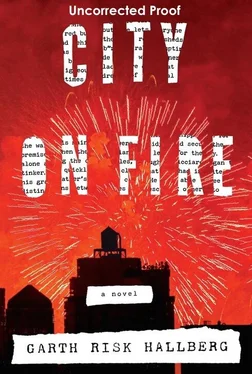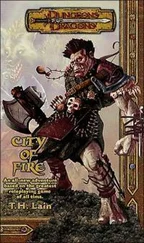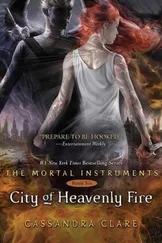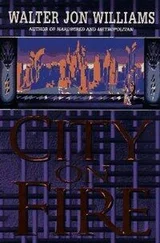He squeezed himself into his lover’s tuxedo and the chesterfield coat William had left behind in favor of his motorcycle jacket — almost as if he’d known. Mercer twisted William’s bow tie around his hand, wanting it, somehow, to hurt. He sipped. When the person in the mirror looked suitably remote, he went down in a hurry, lest he change his mind. It was impossible to find a cab in Hell’s Kitchen after dark, especially when you were, yourself, dark. But the cold turned everything crisp, so that he could see from two long blocks off the train’s half-shattered green globe. The branches of a lone surviving tree, a fruitless Callery pear, were etched in white. Beyond them, through a swirl of snow, the crown of the Empire State Building floated on gossamer light, and Mercer could feel something inside him floating, too — his hopes, he guessed. The year of living passively was over. Tonight, he was taking matters into his own hands, and something big would come of it. Had to come of it. Yes, this year, the Year of Mercer, was going to be different.
REGAN HAD BEEN TOO FAR INSIDEwhat it was to be a Hamilton-Sweeney to see it clearly. To her, the Sutton Place townhouse where she’d grown up had been no different than the homes of her classmates: roomy, sure, but not conspicuously so. Daddy worked long hours, and she and William had the run of the place. By freshman year of high school, she’d known every inch of it, its safest hiding spots and which windows admitted the most sun at which times of day, and it might have gone on this way forever, like a village inside a snowglobe, just the three of them (or four, counting Doonie, their cook and de facto nanny) sealed up in the hermetic clarity her mother’s death left, had the Goulds not had different ideas.
She’d come to see them this way, as a package deal— the Goulds —even though Felicia had appeared first. One evening the table was set for four, and there she’d been in the foyer: a tiny, birdlike woman whose coat Daddy took himself. He introduced his “friend” to Regan, who watched from the stairs, and she didn’t need to be told any more — didn’t need Felicia’s avid hands skimming chairbacks and tables, already sorting the expensive from the merely sentimental, or Doonie’s significant looks, the tight-lipped shake of her head. Then, a few months later, Amory was produced, like a fist from a kid glove. He would be joining the firm, Daddy announced, after several uncharacteristic glasses of wine. William, across the table, hid his irritation under a layer of obsequy. Nor would Felicia’s brother let himself be outfawned, and the dinner became a kind of gladiatorial tournament of insincerity unfolding right in front of Daddy, who beamed all the while, as if he were seated at some other table, in some private, pleasant dream.
Soon Daddy had decided, independently, he said, that William’s gifts would be better served by boarding school. You see? said William, long-distance from Vermont, and then he unveiled a private nickname. The Ghouls play hardball. She told herself this was just his persecution complex, but it was true that Amory and Felicia were around more often with William gone. And when Daddy finally proposed to her, Felicia began plotting to move the entire clan to this castle on the Upper West Side.
Or maybe it wasn’t a castle, it was hard to say. It perched atop a tall brick building, invisible from the street, so that you only ever saw it from within — like one’s own head, it occurred to Regan, standing before it on New Year’s Eve. There was no apartment number, and the word “penthouse,” thanks to Bob Guccione, would have been beneath the dignity of the family name, which Felicia had of course taken as her own. You said you were “here for the Hamilton-Sweeneys.” Those last five syllables had never felt more alien than they did now in Regan’s mouth. The concierge and a coworker were watching a small television behind their desk. Regan couldn’t imagine Felicia approving, but before the concierge’s eyes could detach from the screen, she felt guilty for her condescension. What was his name? Manuel? Miguel? “For the gala,” she added.
The way he looked at her made her conscious of parts of her body she’d been ignoring, the bare clavicle under her coat, the sad décolletage she’d tried to hide with a butterfly pin, the wisp of fugitive up-do tickling her neck. She must look like a high-schooler tarted up for prom. And why should Miguel recognize her? She avoided this place as much as possible. Only recently, with Daddy’s memory crumbling, had she started coming over to get his Hancock on various bits of company business. And besides, she wasn’t the same person she’d been a month ago; she was single. “I’m Regan. The daughter.”
“Jes. Ms. Regan.” He glanced down at his list, as though to double-check she wasn’t part of some terrorist cell seeking to infiltrate the apartment. “I take you right up.”
The elevator was the old-fashioned kind, with a folding gate and an uncomfortably floaty feeling. Though there was a stool next to the levers, Miguel remained standing. Regan couldn’t think of anything to say. Then the gate peeled back to reveal a high-ceilinged entry hall, empty except for the great blue Mark Rothko painting on the wall and, flanking it, two tall, what would you have called them …? Braziers, she supposed, each crowned with a gas-fed flame.
Little about Felicia’s New Year’s gala had changed in a decade. It was like that game, red light/green light. You turned away for a year, life went on, but when you turned back, everything looked just as you’d left it. The same four hundred people, the same conversation, the same drunken laughter at the same stale jokes. The only difference would be the theme. A theme imposed a degree of discipline on the otherwise unruly social body, Felicia believed. The previous year (God, had so little time really passed?), it had been “Hawaiian Night,” meaning that in place of whatever usually topped the end tables had sat vases of birds of paradise and pineapples viscid with glitter-glue. Garlands of real orchids, airlifted from the Pacific, wove precisely through the newels of the staircases. Felicia’s grass skirt had nearly swallowed her wee frame. The year before had been something Iberian; Regan could recall only yards of raw velvet and toreador pants. And what did these braziers signify? Let There Be Light? Let Me Stand Next to Your Fire? If Keith were here, he would have made it a game to guess, but once inside, mingling, would have easily hidden how frivolous he found the whole thing. The thought of facing Daddy and the Goulds without him made her want to retreat to Brooklyn Heights, settle up with the sitter. Half the boxes in the new place remained to be unpacked. But it was too late. Miguel was probably already back at his desk, and here she was, at the threshold, alone. She hung her coat in the front closet, ignoring the coat-check that had been set up in the hallway to her left. Special treatment still made her feel guilty. From several rooms away wafted the drunken noodling of the piano. She took a diver’s deep breath and headed toward it.
It always caught her off guard, the swell of sound as she rounded the corner to the great reception hall, the scores of people. The bolts of green fabric that draped the walls made her think of a ballgame her father had taken her to years ago, before they’d torn down the Polo Grounds and she’d converted to the Yankees — of the dim, pigeon-infested concourses, punctuated by squares of bright green beyond which lay summer and humanity and life. Except that, in the glow of a half-dozen more of the indoor torches, this green was hellish, combustible. Chatter collected in the vaults of the ceiling. Below, each guest wore a half-mask, as in the commedia dell’arte. Her stomach tightened again; no one had told her to bring a mask. Besides which, she hardly saw the point; did people really not recognize each other because this small swath of features — the cheekbones, the bridge of the nose — was covered? No, the true purpose of the masks was to give the hostess a way to confirm that she’d managed to impose her will on the assembled guests. Vis-à-vis Felicia, there were only two viable positions one could take: escape completely, as William ultimately had, or submit.
Читать дальше












